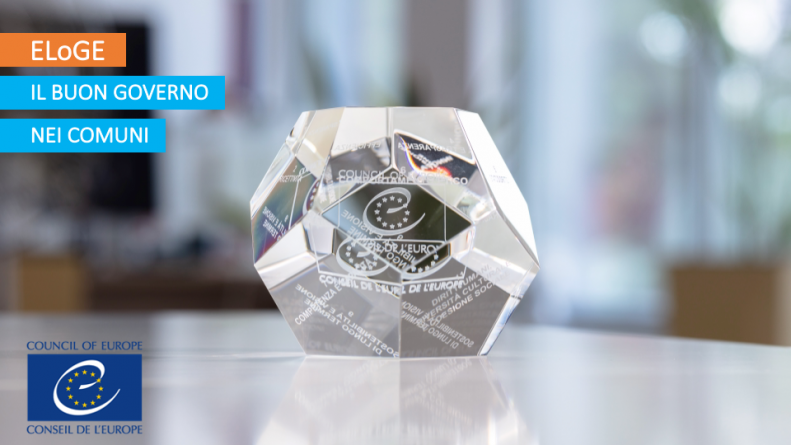Programme- ELoGE
ELoGE – EUROPEAN LABEL OF GOVERNANCE EXCELLENCE
The European Label of Excellence in Governance (ELoGE) is an award from the Council of Europe to local authorities that have achieved a high level of Good Governance in their work.
This award is given by rewarding deserving municipalities with a crystal dodecahedron where one of the 12 Principles of Good Democratic Governance is engraved on each face.
The ELoGE Program is based on a partnership between the Council of Europe and a regional, national or transnational entity or ad hoc platform with proven substantive expertise and experience in the field of good governance, especially at the local level.
Such entities or platforms may apply for accreditation to implement ELoGE at the national level. Accredited entities are responsible for activating the ELoGE program for the benefit of municipalities in a given region or country.
With the help of the Council of Europe’s Centre of Expertise for Good Governance, the accredited entity commits to implementing ELoGE in a significant number of municipalities within a given time frame (usually 6 to 12 months).
This means identifying municipalities that wish to implement ELoGE and helping them undertake the different phases of the program, which include: a self-assessment of the municipal entity, a survey targeting citizens, and a questionnaire targeting elected representatives and municipal officials. These tools are aimed at assessing where municipalities stand with respect to the 12 Principles of Good Democratic Governance.
After careful and thorough analysis of the collected data conducted by a specially composed National Evaluation Platform, the accrediting body awards ELoGE to deserving municipalities that have successfully completed the entire program. This award, valid for one year, is a recognition given to local governments that have achieved a high level of Good Governance according to Council of Europe standards.
But far from being the end of a process, ELoGE is primarily a tool for municipalities to understand their strengths and weaknesses and to initiate actions to address them in the most efficient and effective way. Indeed, the Center of Expertise for Good Governance is ready to follow up on the results of ELoGE by proposing to the municipalities involved, targeted cooperation activities.
Good Democratic Governance reflects the core values of democratic society through the 12 European Principles developed by the Council of Europe. By referring to these Principles, local governments in Council of Europe member states can improve their governance in an ongoing and effective way.
The central governments of member states, acting in parallel, create and maintain the institutional conditions to improve and enhance local government governance, building on the commitments made with reference to the European Charter of Local Self-Government.
Good democratic governance is a requirement at all levels of public administration. In the local sphere, it is of paramount importance, as municipal government is the level of government closest to the citizens. For this reason, Good Governance charts a clear path by focusing on certain aspects and goals to be achieved:
- Greater Participation – The quality, relevance and effectiveness of local government policies depend on broad participation from initial drafting to execution.
- Greater effectiveness – Local government policies must be effective and timely.
- Greater consistency – Local government policies and interventions must be consistent and easy to understand.



